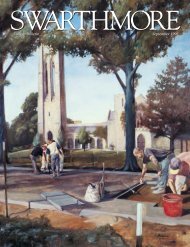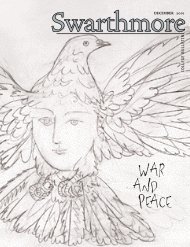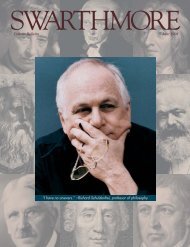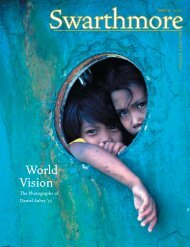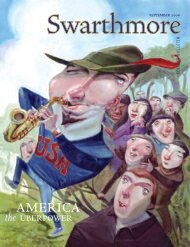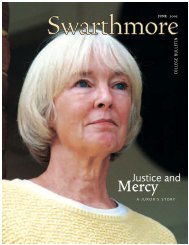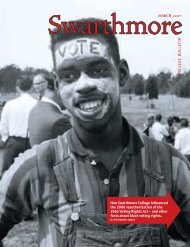Vietnam
Swarthmore College Bulletin (June 2006) - ITS
Swarthmore College Bulletin (June 2006) - ITS
- No tags were found...
You also want an ePaper? Increase the reach of your titles
YUMPU automatically turns print PDFs into web optimized ePapers that Google loves.
collectionA New Deanfor SwarthmoreJames Larimore, current dean of the collegeat Dartmouth, has been appointed dean ofstudents at Swarthmore. Larimore willreplace Robert Gross ’62, who is retiringthis year, after 9 years of service as dean and6 years as associate dean (see page 12).Larimore will oversee aspects of studentlife such as academic advising, career services,health and psychological services, residentiallife, multicultural initiatives, andsocial and extracurricular activities.“I am confident that Jim will bringexceptional energy and vision to the area ofstudent life; will contribute importantly toadvancing Swarthmore’s leadership inAmerican education; and will come quicklyto be regarded as a warm, admired, andtrusted friend of every constituency of theCollege’s community,” President Alfred H.Bloom said.Larimore said: “I look forward to workingwith students, alumni, and my new colleagueson the faculty and staff to build onSwarthmore’s considerable strengths, whichare nurtured and strengthened by the institution’sdistinctive culture of service, ethicalleadership, and academic excellence.”Larimore, 46, has been dean at Dartmouthsince 1999. Previously, he spent 14years at Stanford University, where heLiteracy andSocial JusticeSome commonly held notions of literacy areobstacles to social equality, Diane DownerAnderson, assistant professor of education,says. By “recognizing one discourse as betterthan another,” we reinforce a dominantnotion of literacy that views other ways ofreading, writing, and speaking as “deficient.”Anderson made her remarks at a facultylecture in March, stressing the importance ofdistinguishing “deficit views” from “differenceviews.” A deficit view regards studentsnot speaking in the dominant discourse asinferior; a difference view maintains that onediscourse is different yet not necessarily betterthan another. She said that many studentsin urban and working-class schools doJames Larimore comes to Swarthmorefrom Dartmouth College.served in roles including assistant to theprovost, acting dean of students, deputydean of students, and assistant dean anddirector for Stanford’s American Indian Program.In 1994, Larimore received Stanford’sDinkelspiel Award for Outstanding Serviceto Undergraduate Education, and he wasnamed to Stanford’s Alumni Hall of Fame in2005. Larimore serves on the advisory councilfor the Bill and Melinda Gates Foundation’sMillennium Scholars Program and is amember of the National Vice PresidentsGroup.—Tom Krattenmakernot engage in the dominant discourse andare therefore viewed as “deficient” despitebeing fully engaged in a different, nondominantdiscourse.Anderson said it was important to linkbeyond school sites when investigating studentliteracy and numeracy. Citing the exampleof Danny, a 3-year-old African Americanboy, she said that researchers observed that,when playing the game Chutes and Ladders,Danny played solely to win, resorting tocheating by “double counting” on certainsquares to ensure that he landed on laddersand avoided the chutes.Danny’s teachers saw only a lack ofrespect for the rules or an inability to followthem, whereas the researchers recognized inhis play a sophisticated, well-developedmathematical strategy. Danny had figuredout how and when he should double countCOURTESY OF DARTMOUTH COLLEGEThe Art of TeaThis spring, ceramic bowls crafted by studentsin Associate Professor of Studio ArtSydney Carpenter’s course The Potter’sWheel were exhibited in McCabe Librarywith other artifacts and objects related toJapanese tea ceremonies. One component ofa course that Art History Instructor TomokoSakomura teaches, the exhibit was part of aseries of events titled Crafting Nature: TheArt of the Japanese Tea Ceremony.“The tea ceremony is neither ceremonynor ritual. It is an art form,” Mariko LaFleur,a professor and tea practitioner of the teagroup Urasenke La Salle and the Universityof Pennsylvania, said in a March lecture“Ichigo, Ichie: One Time, One Meeting,” duringwhich she explained the origins of theJapanese tea culture and demonstrated theart of “doing tea”—a complex process thatinvolves sharing the experience with afriend or guest, observing strict rules of teadrinkingetiquette, and incorporating spiritual,philosophical, and aesthetic elements.Students usedbowls made in aceramics class inthe Japanese teaceremony.ELEFTHERIOS KOSTANSsquares based on the board and the numberon the spinner—an impressive task for a3-year-old. Should this boy be seen as a“cheater” or a “precocious mathematician?”Anderson asked.Danny’s intelligence, perhaps even brilliance,was being ignored in the classroombecause the curriculum at the school waslargely focused on socialization—adhering tothe rules was more important than developingstrategies to win. Yet teachers shouldnot overlook or ignore this type of studentliteracy, Anderson said.Next, Anderson showed examples of persuasivewriting by students in elementaryschool, using letters written by a third- anda fourth-grader aimed at persuading theirschool principal to implement a change andessays written by two fifth-graders preparingfor state assessment tests. The disparity4 : swarthmore college bulletin



